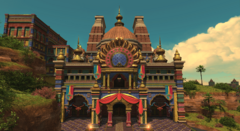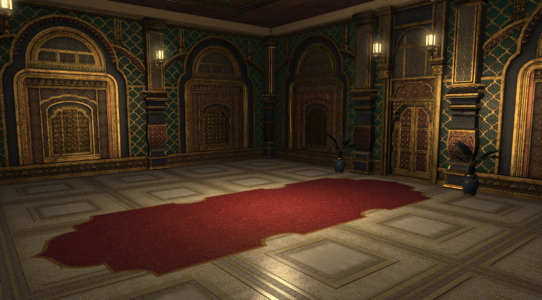Difference between revisions of "Meghaduta"
Jump to navigation
Jump to search
| (One intermediate revision by the same user not shown) | |||
| Line 1: | Line 1: | ||
{{Area infobox | {{Area infobox | ||
| name = Meghaduta | | name = Meghaduta | ||
| type = landmark | | type = landmark | ||
| within = Dharma | | within = Dharma | ||
| aetheryte1 = | | aetheryte1 = {{map icon|mini-aetheryte}} [[Meghaduta]];3.9,10.6 | ||
| aetheryte2 = | | aetheryte2 = | ||
| aetheryte3 = | | aetheryte3 = | ||
| description = The palace of the satrap serves not only as a residence, but also as the center of Radz-at-Han's government. Meaning "cloud messenger” in the old Arkasodara tongue, Meghaduta was built at the summit of a rocky megalith, its great doors admitting an endless stream of servants, petitioners, and official visitors. | | description = The palace of the satrap serves not only as a residence, but also as the center of Radz-at-Han's government. Meaning "cloud messenger” in the old Arkasodara tongue, Meghaduta was built at the summit of a rocky megalith, its great doors admitting an endless stream of servants, petitioners, and official visitors. | ||
| description-source = | | description-source = Encyclopædia Eorzea Volume III, p. 139 | ||
| weather = | | weather = clear skies, fair skies, fog, clouds, rain | ||
| map = | | map = | ||
| levels = | | levels = | ||
| connections = | | connections = | ||
| loading-screen = | | loading-screen = | ||
| screenshot = | | screenshot = Meghaduta exterior.png | ||
| sstext = | | sstext = Meghaduta exterior | ||
| release = endwalker | | release = endwalker | ||
}} | | patch = 6.0 | ||
}} It is the home of the satrap, and Radz-at-Han's government. | |||
==Additional Information== | ==Additional Information== | ||
{{see also|Fishing Log: Meghaduta}} | {{see also|Fishing Log: Meghaduta}} | ||
*Only the entrance room to '''Meghaduta''' is accessible to be explored outside of cutscenes. Through cutscenes, the building is implied to be much bigger than it appears on the map, with scenes taking place in various inaccessible rooms, such as a throne room and guest quarters. | |||
==Trivia== | |||
*'''Meghadūta''' translates to ''Cloud Messenger'' in Sanskrit, which is the same as the old [[Arkasodara]] translation.<ref name=wiki>[[wikipedia:Meghadūta|Wikipedia: ''Meghadūta'']]</ref><ref>Encyclopædia Eorzea Volume III, p. 139</ref> | |||
*'''Meghadūta''' is a lyric poem written by the famous Sanskrit poet, ''[[wikipedia:Kalidasa|Kālidāsa]]''. The poem tells the story of a benevolent nature spirit that has been banished to an isolated mountain top, and asks a cloud to deliver a loving message to his wife.<ref name=wiki /><ref>[https://www.britannica.com/topic/Meghaduta Britannica: ''Meghaduta'']</ref><ref>[https://culturalsamvaad.com/meghaduta-by-kalidasa-an-introduction/ Cultural Samvaad: ''Meghadūta by Kālidāsa – An Introduction'']</ref> | |||
==Images== | |||
<gallery heights=200px mode=packed> | |||
File:Meghaduta interior.png|'''Meghaduta''' interior | |||
</gallery> | |||
==References== | |||
<references/> | |||
Latest revision as of 09:39, 7 September 2024
“The palace of the satrap serves not only as a residence, but also as the center of Radz-at-Han's government. Meaning "cloud messenger” in the old Arkasodara tongue, Meghaduta was built at the summit of a rocky megalith, its great doors admitting an endless stream of servants, petitioners, and official visitors.
— Encyclopædia Eorzea Volume III, p. 139
Meghaduta is a landmark in Dharma, Radz-at-Han. It is the home of the satrap, and Radz-at-Han's government.
Additional Information
- See also: Fishing Log: Meghaduta
- Only the entrance room to Meghaduta is accessible to be explored outside of cutscenes. Through cutscenes, the building is implied to be much bigger than it appears on the map, with scenes taking place in various inaccessible rooms, such as a throne room and guest quarters.
Trivia
- Meghadūta translates to Cloud Messenger in Sanskrit, which is the same as the old Arkasodara translation.[1][2]
- Meghadūta is a lyric poem written by the famous Sanskrit poet, Kālidāsa. The poem tells the story of a benevolent nature spirit that has been banished to an isolated mountain top, and asks a cloud to deliver a loving message to his wife.[1][3][4]
Images
References
- ↑ 1.0 1.1 Wikipedia: Meghadūta
- ↑ Encyclopædia Eorzea Volume III, p. 139
- ↑ Britannica: Meghaduta
- ↑ Cultural Samvaad: Meghadūta by Kālidāsa – An Introduction

